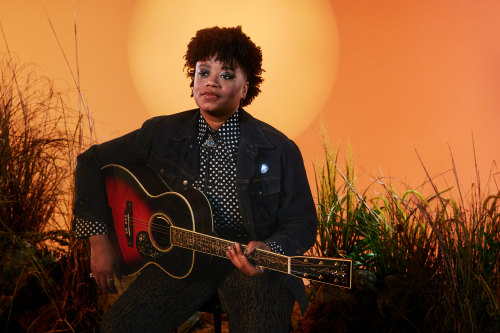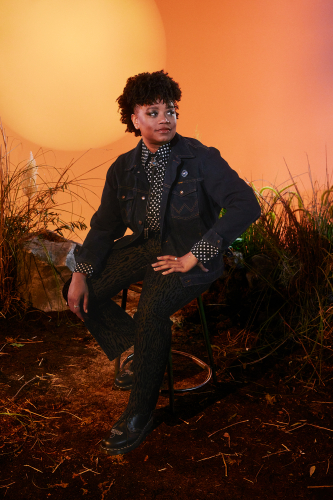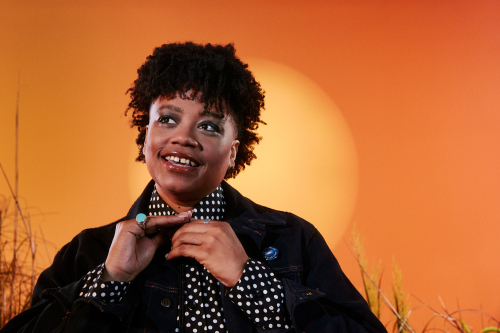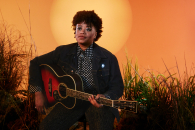Amythyst Kiah
Click  on photo to download high resolution version
on photo to download high resolution version
All rights reserved. Photos are for editorial use only.
Photos
Videos
Latest ReleaseView All
Still + Bright
Release date: 10.25.24
Label: Rounder Records
Press Releases View All
Amythyst Kiah Shares “Silk And Petals,” A Gothic Love Song Inspired By ‘The Haunting Of Bly Manor’
Read MoreAmythyst Kiah Taps Billy Strings For Fantasy-Inspired Folk Epic
Read MoreAmythyst Kiah Finds Joy On New Album Still + Bright, Out Oct. 25 Via Rounder Records
Read MoreBiography View
Produced by Butch Walker (Taylor Swift, Green Day, Weezer) and recorded at his Nashville studio, Amythyst Kiah’s new album Still + Bright explores the vast expanse of her inner world: her deep-rooted affinity for Eastern philosophies and spiritual traditions, a near-mystical connection with the natural world, the life lessons learned in her formative years as a self-described “anime-nerd mall goth.” In dreaming up the backdrop to her revelatory storytelling, Kiah and Walker arrived at a darkly cinematic and exhilarating twist on the rootsy alt-rock of her 2021 breakthrough album Wary + Strange—an LP that landed on Rolling Stone’s list of the 25 Best Country and Americana Albums of 2021 and drew acclaim from major outlets like Pitchfork. With its sonic palette encompassing everything from fuzzed-out guitars and industrial-leaning beats to gilded pedal steel and Kiah’s exquisitely graceful banjo work, Still + Bright fully affirms her as an artist of both daring originality and uncompromising depth.
On Wary + Strange, Kiah offered up a collection of spellbinding songs detailing her experience with grief and trauma and alienation, each illuminating the extraordinary impact of her songwriting. An electrifying showcase for her singular musicality and soul-stirring voice, Kiah’s Rounder Records debut soon found many leading critics hailing her as a formidable new talent, adding to a list of accolades that includes earning a Grammy nomination for her powerhouse anthem “Black Myself.” But when it came time to create her follow-up, the Tennessee-born singer/songwriter felt compelled toward a profound shift in her artistry. “On the last record it felt so cathartic to write about all the pain I was dealing with, but this time the songs came from a place of finding joy in the music,” says Kiah. “In the past I felt so mired down with anxiety that I sometimes held back from what I really wanted to write about; I felt like I needed to play it safe and keep certain thoughts to myself. But now I’m at a point where I’m confident in what I value and love, and because of that I’ve made the album I’ve always wanted to make.”
Although Kiah’s third full-length marks a departure from the anguished emotionality of its predecessor (an album informed by losing her mother to suicide at age 17), Kiah imparts all of Still + Bright with a hypnotic intensity born from boldly stating her convictions. To that end, the LP opens on the stormy grandeur of “Play God and Destroy the World”: an immediately captivating coming-of-age tale featuring guest vocals from Kentucky-bred singer/songwriter S.G. Goodman. With its title taken from a song Kiah penned and performed at a talent show in high school, the hard-charging track dispenses a bit of searing commentary on the hypocrisy she witnessed throughout her childhood—and ultimately speaks to the sense of hope and possibility she discovered in unexpected places (e.g., the humanistic sci-fi of The Matrix). “I grew up in a good neighborhood and had parents with good jobs, but in many respects my family was different,” says Kiah, who was raised in Chattanooga and later moved to Johnson City. “In order to fit in, you had to go to church and have conservative values—and I know that being Black wasn’t doing us any favors either. This song was written for the 15-year-old version of me who suspected that there was a big world out there that allowed for many beliefs and a more connected humanity.”
On songs like “S P A C E,” Kiah turns inward and ponders her search for peace of mind in times of maddening uncertainty. “As someone whose identity is tied up in being a touring musician, the pandemic created a lot of anxiety where I started questioning who I was if I wasn’t out on the road,” says Kiah. “There were moments when I dealt with that by scrolling through Instagram, but over time I started to treasure the quiet. Meditation became an important part of my life, and I eventually wrote ‘S P A C E’ about learning to be more present.” Partly written on banjo, “S P A C E” unfolds as a soulful outpouring laced with lush mandolin lines, lovely fiddle melodies, and a powerfully soaring vocal performance from Kiah. “One of my main goals for this album was to show a new side of myself as a singer,” she notes. “I’ve always loved really strong, gospel-style vocals, and I put a lot of work into increasing my range for this record.”
Another track spotlighting the stunning force of her voice, “Empire of Love” presents what Kiah refers to as “my personal theme song”: an impassioned statement of devotion to her journey as a spiritual seeker, gorgeously wrought in brooding guitar riffs and fiercely delivered poetry (“My religion is none at all/I build my own cathedrals and let them fall…I pledge allegiance to my soul/I’ll follow where she needs to go/I’m a pilgrim for the empire of love”). Inspired by her ever-deepening connection to the Appalachian landscape—and by her interest in Western humanities and Eastern religions—“Empire of Love” finds Kiah constructing her own belief system firmly rooted in compassion and curiosity. “I believe in carving a path in life that honors my own experiences in the context of the wider world,” says Kiah, who co-wrote “Empire of Love” with Sean McConnell. “As a seeker in the mountains, my sense of spiritual connection stems from nature, which is connected to all of the cosmos. And there is no religious or social dogma that can change that.”
All throughout Still + Bright, Kiah reveals her rare ability to spin her fascinations into songs uncovering essential truths about human nature. On “I Will Not Go Down,” for instance, she looks back on a barbaric moment in history and unleashes a furiously stomping folk epic, featuring background vocals and nimble guitar work from bluegrass phenomenon Billy Strings. “I read about the Crusades in high school, and I was disgusted at the prospect of coercing people into spilling an unimaginable amount of blood and brainwashing them into believing they were serving their god—when in fact they were simply doing the bidding of warmongers,” says Kiah. “I wrote the chorus in my high school journal, and it became a song about people-pleasing to a fault, then reclaiming your autonomy and finding a balance between serving yourself and serving others.” Meanwhile, on “Silk and Petals,” Ellen Angelico’s feverish guitar tones merge with strangely euphoric grooves in a gothic love song sparked from Kiah’s viewing of the supernatural horror-drama of The Haunting of Bly Manor. “‘Silk and Petals’ was inspired by the story of the Lady in the Lake, the ghost of a woman named Viola Lloyd,” Kiah explains. “After falling ill with tuberculosis, Viola leaves her chest of her finest clothes and jewelry to her daughter, then becomes violent as she witnesses the affection between her husband Arthur and her sister Perdita. While Arthur is away on business, Perdita smothers Viola in her sleep, only to later be strangled to death by Viola’s ghost. The Lady in the Lake then wanders the hallways for centuries searching for her daughter, killing anyone who moves into the house along the way. I wrote ‘Silk and Petals’ thinking about the idea of ghosts being unable to leave this realm because they’re hanging onto something they’ve lost, and the song came from being so intrigued by that very intimate intermingling of love and death.”
For Kiah, the making of Still + Bright involved a careful transformation of the songwriting process she adopted after composing her first song on a Fender acoustic at age 13. The latest turn in a dynamic career that’s included joining Our Native Daughters (an all-women-of-color supergroup also featuring Rhiannon Giddens, Leyla McCalla, and Allison Russell), the album marks her first time opening up her approach and working with co-writers, including punk legend Tim Armstrong, Sadler Vaden (a guitarist/vocalist for Jason Isbell’s 400 Unit), former Pentatonix member Avi Kaplan, and Sean McConnell (a singer/songwriter who’s also written with Brittney Spencer and Bethany Cosentino). “In a way I almost felt like I had to relearn how to write songs, because the experience had changed so much for me after taking better care of my mental and physical wellbeing over the past few years,” she says. “It felt completely different to write from a place of fulfillment and wanting to have fun with what I was creating.”
While Still + Bright undoubtedly finds Kiah pushing into new emotional and musical terrain, the album also makes for a vital new addition to a body of work largely dedicated to exploring the struggle and joy of true self-discovery. “With all of my music, I’d love to leave people with the feeling that it’s okay to go off the beaten path and to structure your life in a way that feels right to you,” says Kiah. “And just like with the last record, I hope that these songs can help people out if they’re going through a difficult time. That’s what I always hope for more than anything: for my music to continue to be a part of the healing process for anyone who might need it.”
Online
Press Clippings
- Bandcamp Daily
- Billboard: 5 Must-Hear Songs
- The Bluegrass Situation
- The Bluegrass Situation (2)
- Bringin' It Backwards
- Brooklyn Vegan (1)
- Brooklyn Vegan (2)
- CBS Saturday: Silk And Petals
- CBS Saturday: Empire of Love
- CBS Saturday: S P A C E
- Chicago Reader
- Creem Magazine
- Consequence
- Consequence Best Songs of 2024
- Folk Alley
- Garden & Gun: premiere
- Great American Folk Show
- JamBase (1)
- Jambase (2)
- JamBase (3)
- Kennedy Center Honors Performance
- Nashville Lifestyles
- New York Times: Playlist
- NPR: New Music Friday
- No Depression (1)
- No Depression (2)
- No Depression (3)
- Premier Guitar
- Relix
- Rolling Stone (1)
- Rolling Stone (2)
- The Tennessean
- Westchester Magazine
- WFUV
- WFUV (2)
- WNYC: All of It With Alison Stewart
- WNYC All Of It (2)
- WXPN
- Acoustic Guitar
- American Songwriter (1)
- American Songwriter (2)
- The Bluegrass Situation
- Brooklyn Vegan (1)
- Brooklyn Vegan (2)
- Brooklyn Vegan (3)
- CMT
- Consequence
- Garden & Gun: Back Porch Session
- Guitar Player
- JamBase
- New Sounds
- PBS: Echo Sessions
- People Magazine
- Rolling Stone (1)
- Rolling Stone (2)
- Rolling Stone Country
- Southern Living: Biscuits and Jam Podcast
- Vanity Fair
- Vanyaland
- World Cafe
- American Songwriter
- American Songwriter: Best Albums of 2021
- Apple Music's Proud Radio
- The AV Club
- Bandcamp
- Bandcamp: Best of 2021
- Basic Folk: podcast
- BET Soul: video
- Billboard (1)
- Billboard (2)
- The Bluegrass Situation
- Bringin' It Backwards Podcast
- The Boot (1)
- The Boot (2)
- Buzzfeed
- CBS Saturday: Black Myself
- CBS Saturday: Wild Turkey
- CBS Saturday: Tender Organs
- CMT: video
- Ebony
- Garden & Gun
- Glide
- Holler.
- Jimmy Kimmel Live
- musicREDEF
- New Sounds
- The New York Times: feature
- The New York Times: Playlist
- No Depression (1)
- No Depression (2)
- No Depression (3)
- NPR All Songs Considered
- NPR Heavy Rotation
- NPR Morning Edition
- NPR: The Best Music of 2021 (1)
- NPR: The Best Music of 2021 (2)
- Rolling Stone: RS Recommends
- Rolling Stone Country: interview
- Rolling Stone Country (1)
- Rolling Stone Country (2)















_400_400_s_c1.jpg)